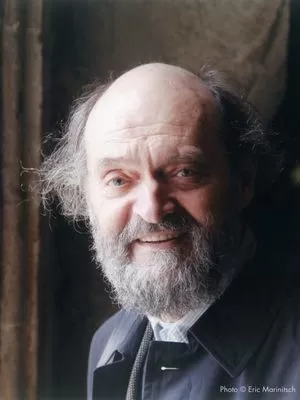Arvo Pärt
composer
Estonian-born Arvo Pärt (1935) is one of these composers whose creative output has significantly changed the way we understand the nature of music. Since 1976, his unique tintinnabuli compositions have established a new kind of musical paradigm – a radically different approach to many aspects of music, as well as to interpretation and listening.
As one of the most radical representatives of the Soviet avantgarde, Pärt’s work passed through a profound evolutionary process: from neo-classical piano music to the individual use of dodecaphony, composition with sound masses, chance music and collage technique.
After his last and most dramatic collage piece Credo (1968), Pärt withdrew for almost eight years. In 1976, after intensive study of Gregorian chant, the Notre Dame School and classic vocal polyphony, he emerged with a new and highly original musical language which he called tintinnabuli (tintinnabulum – Latin for ’little bell’) and which has defined his work up to today.
Tintinnabuli first appeared in a short piano piece Für Alina (1976), a subsequent rush of new works included Fratres, Cantus in Memory of Benjamin Britten and Tabula rasa (1977), which remain among his most highly regarded.
In 1980 Arvo Pärt was urged by public authorities to leave the country. He and his family settled first in Vienna and then West Berlin. Important works like Passio, Te Deum, Miserere, Lamentate, Symphonie No. 4, Adam’s Lament, and numerous choral works have been created ever since and have been performed worldwide.
His ‘musical Credo’ is rooted in the Christian tradition, and since the Word (Logos) plays a vital and even structural role in Pärt’s compositional process, both his orchestral and vocal works are mostly based on liturgical texts. Pärt’s oeuvre is rich and versatile, including many large-scale compositions for choir and orchestra, four symphonies and works for soloists and orchestra, as well as numerous choral pieces and chamber music.
- Arvo Pärt was born on 11 September 1935 in Paide.
- After studying at the Tallinn State Conservatory with Heino Eller, he worked as a sound engineer at Estonian Radio from 1958 to 1967.
- From the end of the 1960s, Pärt has been working as a freelance composer.
- In 1980 Arvo Pärt emigrated with his family to Vienna and started collaboration with Unversal Edition that still continues today. A year later he received the DAAD (Deutscher Akademischer Austausch Dienst) scholarship and moved to Berlin, where he lived for almost 30 years.
- The year 1984 marks the beginning of his creative collaboration with the distinguished CD label ECM and producer Manfred Eicher, and the first recording of Tabula rasa. The result of this close creative relationship of more than 30 years is a significant number of authorised recordings, completed through the active involvement of the composer, and which are now available under the ECM label.
- In 2010, Pärt returned to Estonia where he resides today. The same year the Arvo Pärt Centre, which holds Pärt’s personal archive, was established in Laulasmaa, near Tallinn, by the composer’s family.
- His numerous awards include honorary membership of American Academy of Arts and Letters (1996), Classical Brit Awards (2003, 2011), Léonie Sonning Music Prize (2008), Premium Imperiale (2014) and Ratzinger Prize (2017).
- He is a member of the Pontifical Council for Culture in Vatican and holds honorary doctorates from several universities, University of Sydney, Australia (1996), University of Durham (2002) and University of St Andrews, United Kingdom (2010), St Vladimir’s Orthodox Theological Seminary, USA (2014), Oxford University, United Kingdom (2016) among others.
Arvo Pärt Centre
